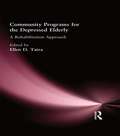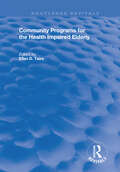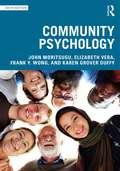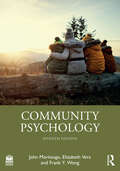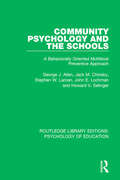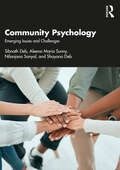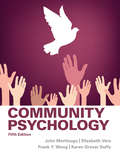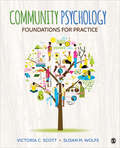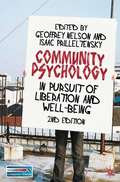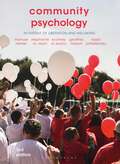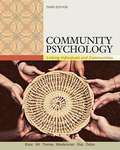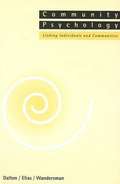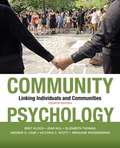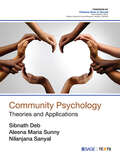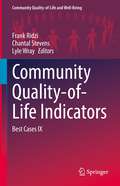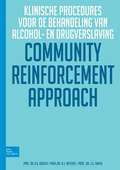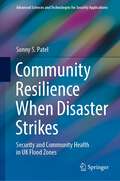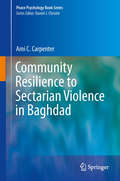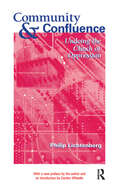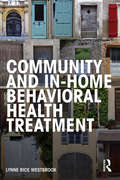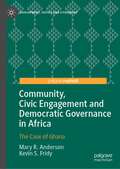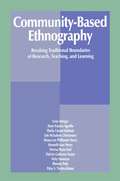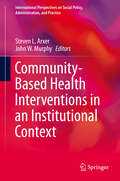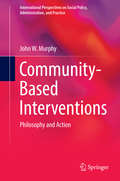- Table View
- List View
Community Programs for the Depressed Elderly: A Rehabilitation Approach
by Ellen D TairaInternational experts offer insights into rehabilitative work with the depressed elderly, including examples of successful treatment models, assessment and prevention techniques, as well as other helpful methods of alleviating depression in the institutionalized elderly.
Community Programs for the Health Impaired Elderly
by Ellen D TairaHere is one of the first volumes focusing on the therapist's role in providing rehabilitation services for the expanding population of health impaired elderly who are living in the community. With changes in reimbursement policies for home care and out-patient services, the increased number of older persons living in the community, and most recently, the DRG and Prospective Payment initiatives, the role of institutions continues to diminish and the press for community alternatives is becoming more urgent with each new directive from government agencies. This exciting book includes an overviw of possibilities for the very frail person who might otherwise require an institutional setting. Other topics include management of the diabetic in the community, the sexual needs of older adults, crucial components to successful community living for anyone with a health impairment, and the timely and personal topic of coping with the death of a patient.
Community Psychology
by Karen Grover Duffy Frank Y Wong Elizabeth Vera John MoritsuguCommunity Psychology, 6th Edition offers an easy-to-navigate, clearly organized, and comprehensive overview of the field, with theoretical roots that carry over to practical applications. Presenting the concepts of community psychology and social change, these concepts are then applied to various systems addressing the human condition: mental health, medical, public health, school, legal, and industrial/organizational. Through a unique three-part approach, including concepts, interventions, and applications of the theory, the book opens the field of community psychology to students who are interested in how psychology might help themselves and the systems around them. It then focuses on the prevention of problems, the promotion of well-being, the empowerment of members within a community, the appreciation of diversity, and an ecological model for the understanding of human behavior. Attention is paid to both "classic" early writings and the most recent journal articles and reviews by today’s practitioners and researchers. Historical and alternative methods of effecting social change are explored in this book, with the overall theme that the environment is as important as the individual in it. This 6th edition will include new topical subjects such as grit and life success, changes in technology and their impact, interventions based on networking, social movements and justice, dealing with stigma, and new models of health. It will appeal to advanced undergraduates as well as graduates taking courses on community psychology, social psychology, clinical psychology, and related fields.
Community Psychology
by Elizabeth Vera John Moritsugu Frank Y. WongCommunity Psychology, 7th Edition presents the field’s conceptual roots and possible applications in a comprehensive overview of the field. Clearly organized and easy to navigate, the text is divided into sections on basic concepts, social change, applications, and the future.The book opens the field of community psychology to students who are interested in how psychology is relevant to their own lives and the systems around them. The applied chapters discuss how community psychology relates to mental health, social and health services, schools and children, law and crime, health and public health, and community/organizational psychology. The new edition updates research and literature and presents developments in theoretical and research methodologies. This edition focuses particularly on description and consideration of critical theory, liberation theology, and decolonization as part of community psychology’s intellectual and value-based evolution. Examples of community psychology in practice are provided throughout the text, and each chapter also features discussion questions for students to consider. A student website and instructor resources provide further ways to engage with the content and support teaching and learning.This highly engaging book explores social change, the mental health of the community, and the importance of the environment upon the individual. It will appeal to advanced undergraduates as well as graduates taking courses on community psychology, social psychology, clinical psychology, and related fields.
Community Psychology and the Schools: A Behaviorally Oriented Multilevel Approach (Routledge Library Editions: Psychology of Education)
by John E. Lochman George J. Allen Jack M. Chinsky Stephen W. Larcen Howard V. SelingerOriginally published in 1976, this volume begins with a theoretical overview of the major trends in the community psychology movement at the time, as well as a perspective on how the field was developing. The emphasis is on the utility of combining a preventative community-centered orientation with an applied behavioral-analytic focus. The authors take general theoretical notions and demonstrate how they can be turned to concrete methods of dealing with specific practical problems that occur in implementing a ‘real-life’ program of community oriented intervention. The authors present an innovative model for developing a low cost and effective delivery system for mental health services in public schools. They describe the actual development and implementation of such a system in the school, and also include a comprehensive evaluative scheme for determining the efficacy of this type of endeavor. The actual behavior change strategies that are employed can be used effectively by teaching personnel or psychologists on either a large or small scale. A final unique feature of the volume is the inclusion of a program that will assist teachers and mental health professionals in helping elementary school students learn social problem-solving skills.
Community Psychology: Emerging Issues and Challenges
by Sibnath Deb Aleena Maria Sunny Nilanjana Sanyal Shayana DebThis book focuses on the theoretical concepts of community psychology and its applications in day-to-day life. It discusses the challenges that adversely affect the welfare and well-being of common people and suggests community-centric, evidence-based measures to address them. Factors like new-age lifestyles, fast-paced development, and an increase in occurrence of natural calamities have been detrimental to the psychological well-being of the community. This volume integrates the social, cultural, economic, political, and environmental aspects of community psychology to address community life-based issues which include mental health stigma, social asymmetries, resource disparities, disadvantaged minority groups, the differently abled, HIV/AIDS patients, project-affected people, and disaster victims. Key features of this book include: • Dedicated intervention-based chapters on mental health, physical health, differently abled people, the elderly, vulnerable children, HIV/AIDS patients, and people affected by development projects and disasters. • Focus on challenges faced by students and school-based family counselling. • Case studies and conceptual models for better understanding and application of the subject. The volume will be a valuable resource to students, researchers, and teachers of Psychology, Social Work, Sociology, Public Health, and Social Economics. It will also be an indispensable read for social workers, NGOs, advocacy groups, and policymakers working in the field of social upliftment.
Community Psychology: Fifth Edition (Mysearchlab Series 15% Off Ser.)
by Karen Grover Duffy Frank Y Wong Elizabeth Vera John MoritsuguCommunity Psychology, 5/e focuses on the prevention of problems, the promotion of well-being, empowerment of members within a community, the appreciation of diversity, and an ecological model for the understanding of human behavior. Attention is paid to both "classic" early writings and the most recent journal articles and reviews by today's practitioners and researchers. Historical and alternative methods of effecting social change are explored in this book, with the overall theme that the environment is as important as the individual in it.This text is available in a variety of formats - digital and print. Learning Goals Upon completing this book, readers will be able to: Understand the historical and contemporary principles of community psychology. Apply theory and research to social services, mental health, health, legal, and public health systems
Community Psychology: Foundations for Practice
by Dr Victoria Chien Scott Dr Susan M. WolfeDrawing upon the wisdom of experts in the field, this reader-friendly volume of Community Psychology edited by Victoria Scott and Susan Wolfe explores both foundational competencies and the technical how-to skills needed for engaging in community psychology practice. Each chapter explores a core competency and its application in preventing or amending community problems and issues. With case examples throughout, this book offers a practical introduction to community outreach and intervention in community psychology.
Community Psychology: In Pursuit of Liberation and Well-Being
by Isaac Prilleltensky Geoffrey NelsonFeaturing a wide range of critical perspectives, international examples, exercises and additional online resources, this textbook will encourage students to think more critically about the role of psychology in society and about how community psychology can aid in the liberation of oppressed groups to promote social justice and well-being.
Community Psychology: In Pursuit of Liberation and Well-Being
by Manuel Riemer; Stephanie M. Reich; Scotney D. EvansThis visionary textbook is the third edition of a trusted and highly respected introduction to community psychology. The editors have focused on three contemporary social issues in order to illustrate key concepts throughout the book: climate change, affordable housing and homelessness, and immigration. Featuring a wide range of critical perspectives from international scholars and practitioners, Community Psychology encourages students to consider theories and methodologies in light of how they might be applied to different cultures and settings. <p><p>It develops students' ability to think critically about the role of psychology in society, and about how the work of community psychologists can aid in the liberation of oppressed groups, promoting social justice and flourishing both for people and for our planet. This book is essential reading for students taking both undergraduate and graduate courses in Community Psychology and its related fields.
Community Psychology: Linking Individuals and Communities
by Maurice J. Elias Elizabeth Thomas James H. Dalton Abraham Wandersman Jean Hill Bret KloosWith COMMUNITY PSYCHOLOGY, Kloos, Hill, Thomas, Wandersman, and Dalton have addressed the challenge of transforming an abstract, theoretical topic into a lively and understandable subject for students. Through concrete examples and consistent pedagogy, this text helps students understand the concepts as well as how to apply them. After introducing community psychology and its history, the authors describe methods of community research and discuss how to understand communities from the perspectives of sense of community, coping, and social support. The focus then shifts to community programs and actions: preventing problem behavior and promoting social competence, citizen participation, organizing for community and social change, and program evaluation and development.
Community Psychology: Linking Individuals and Communities
by Maurice J. Elias James H. Dalton Abraham WandersmanDalton, Elias, and Wandersman have answered the challenge of taking an abstract, theoretical topic and making it lively and understandable with concrete examples so students can understand the concepts and be excited. The authors do this through consistent pedagogy across the book, and most importantly, create opportunities for students to practice applying these concepts, bringing them alive for students. After introducing community psychology and its history, the authors describe methods of community research, and discuss how to understand communities from the perspectives of ecological diversity, sense of community, coping, and social support. The focus then shift to community programs and actions: preventing problem behavior and promoting social competence, citizen participation, organizing for community an social change, and program evaluation and development.
Community Psychology: Linking Individuals and Communities
by Elizabeth Thomas Abraham Wandersman Jean Hill Bret Kloos Andrew D. Case Victoria C. ScottThe fourth edition of this textbook provides an in-depth and engaging overview of community psychology, including its theoretical underpinnings and methods for conducting research and promoting change within communities. This book aims to get students, including nonpsychology majors, excited about the field and being agents of social change. New to this edition are an increased focus on values, particularly those related to social justice, empowering minority communities, and solving complex societal problems--like poverty, oppression, and climate change--across multiple ecological levels. <p><p> New research and case examples present important developments in the field and society at large, accompanied by extensive discussion questions that will encourage self-reflection and help students apply key concepts to their own lives. A new marginal glossary also highlights important concepts.
Community Psychology: Theories and Applications
by Sibnath Deb Aleena Maria SunnyIt is a textbook for undergraduate and postgraduate students of Psychology and Applied Psychology. UG and PG Students of Social Work will also find this book helpful. Community Psychology: Theories and Applications goes beyond individual focus and directs its attention to community as the centre of intervention. It dwells on the contemporary problems and challenges of the common people at the community level. This book addresses the application of community psychology to a broad range of social problems such as mental health stigmas, physical health challenges, social asymmetries, resource disparities, disadvantaged minority groups, the differently abled, persons with HIV/AIDS, and disaster victims among others. One of the first textbooks on community psychology in India, this book is an attempt to find new ways to empower communities, encourage social change and promote diversity. Key Features: •Focus on governmental and non-governmental response toward rescue, intervention and rehabilitation of people who require immediate attention •Dedicated intervention-based chapters on school children, elderly, differently abled and project-affected people for addressing the challenges faced by specific communities •Case Studies and conceptual models for better understanding and application of the subject. •In-depth analysis of contemporary issues and strategies for way forward suggested.
Community Quality-of-Life Indicators: Best Cases IX (Community Quality-of-Life and Well-Being)
by Frank Ridzi Chantal Stevens Lyle WrayThis volume continues the tradition now established since 2006, of compiling excellent research into the practice and application of community indicators in a single source volume. It focuses on the theme of the Community Indicators Consortium 2020 Summit, as a significant venue for the advancement of the practice and theory of community indicators work. It covers the conference's theme of “community resilience”, which is the capacity of all of a community’s elements to survive, adapt, and grow no matter what kinds of chronic stresses and acute shocks they experience. In keeping with the practical, “best cases” emphasis of this book series, the editors incorporate a case-based approach to chapters discussing how specific indicators, indices or series of indicators can lead to better decisions and outcomes to help communities adapt and transform in the face of challenges, helping them prepare for both the expected and the unexpected to sustain and improve quality of life, including technology and open source approaches to data sharing and data-focussed collaboration; evolving approaches that use shared indicators to improve overall community well-being and quality of life; research related to community indicators and policy, application, research, and/or practice; and techniques and approaches to measure resilience. This volume is of interest to social scientists, management professionals, social workers and policy makers working on various aspects of community indicators of quality of life and well-being. Chapter “The Cost of Sea Level Rise for the Island Community of Vinalhaven, Maine: Spurring action through collaborative data analysis” is licensed under the terms of the Creative Commons Attribution 4.0 International License (http://creativecommons.org/licenses/by/4.0/). For further details see licence information in the chapters.
Community Reinforcement Approach
by H. G. Roozen R. J. Meyers J. E. SmithDeze uitgave beschrijft op beknopte wijze verschillende procedures op het gebied van de Community Reinforcement Approach. Voor iedere procedure wordt verwezen naar het Handboek voor de behandeling van alcoholverslaving als naslagwerk. Dit werk geeft veel achtergrondinformatie over de klinische praktijk van de CRA, de theoretische grondslagen, en de wetenschappelijke onderbouwing. Sinds de verschijning van dit handboek raakt CRA in toenemende mate ingeburgerd in de klinische behandelpraktijk van de Nederlandse verslavingszorg, geestelijke gezondheidszorg en forensische psychiatrie. CRA maakt gebruik van operante leerprincipes en benadrukt de positieve aspecten in het leven van de verslaafde om duurzame gedragsveranderingen te realiseren. CRA probeert waarde en integriteit toe te voegen in gedragstherapeutische termen. Voor veel hulpverleners is het een plezierige manier van werken met soms toch moeilijke patiëntpopulaties. Dit boek omvat een handzame en praktische opzet waarbij voor iedere CRA-procedure een systematische weergave van de werkwijze wordt beschreven met een checklist om de behandelintegriteit te kunnen toetsen. Daarnaast zijn de relevante CRA-formulieren terug te vinden die telkens binnen de procedure(s) worden gebruikt. Hierdoor is de CRA aanpak direct toepasbaar in de dagelijkse hulpverlening. Het boek is toegesneden op de toepassing in een poliklinische setting, maar de aanpak kan evenwel, al dan niet met aanpassingen, toegepast worden in een andersoortige setting zoals een deeltijd of een klinische omgeving. Het wordt aanbevolen voor zorgprofessionals uit de klinische praktijk, zoals psychiaters, artsen, psychologen, verpleegkundigen, agogen en andere professionals die actief zijn in de zorg.
Community Resilience When Disaster Strikes: Security and Community Health in UK Flood Zones (Advanced Sciences and Technologies for Security Applications)
by Sonny S. PatelThis book addresses the operationalization of community resilience in the United Kingdom (UK) in connection with severe floods. Written for early academic professionals, students, and community practitioners, it investigates the educational and practical meaning and application of community resilience using a UK-centric local-level case study. Exploring the perceptions of both those who have been affected by a natural hazard and those who have not, the book reveals how trust, community resources, and neighborhood security can offer effective ways of bringing communities together after a natural hazard. The author introduces the topic of community resilience as it applies to disasters in Chapter 1 and its implications for securing and improving the wellbeing of disaster-affected communities in Chapters 2 and 3. In Chapter 4, the lessons learned contributing to the available information and research on community resilience are reviewed. Finally, the author offers recommendations and outlines future directions in coping with the uncertainty and insecurity caused by natural hazards in Chapter 5.
Community Resilience in Natural Disasters
by Diane Bretherton Anouk RideTold through the voices of local community leaders, this book analyzes how communities respond to natural disasters and how outsiders contribute positively - or negatively - to their response, promoting debate on the role of aid and the media in times of crisis.
Community Resilience to Sectarian Violence in Baghdad (Peace Psychology Book Series)
by Ami C. CarpenterThe recent conflict in Iraq evolved from an insurgency against the interim U. S. led government (the Coalition Provisional Authority or CPA) into a sectarian civil war. Violence became widespread, especially in areas of Baghdad City such as Sadr City, Al Amiriyah, and Al Adhamiya. However, a number of multiethnic neighborhoods in Baghdad successfully prevented sectarian attitudes and behaviors from taking hold. Four communities stand out in their self-organization to prevent the escalation of violence. This book looks at what makes these communities different from other areas within Baghdad. In-depth interviews in Sunni-dominant, Shia-dominant and Mixed neighborhoods generated a few key insights about conflict-resilience, or the capacity to prevent structural changes associated with conflict escalation. Key factors turned out to be the organization of non-sectarian self-defense groups, place attachment, collective efficacy, active intervention to de-escalate tensions, and also the presence of local religious leaders who forbid sectarian attacks. The continuity or strength of interpersonal relationships supported by the integrated physical structure of these neighborhoods and internal versus tribal conflict resolution mechanisms played a role as well. This volume examines the characteristics of the communities that have successfully prevented the rise of violence, and how they are able to maintain qualities of resilience to violent conflict.
Community and Confluence: Undoing the Clinch of Oppression
by Philip LichtenbergBridging the gap between psychology and politics, Lichtenberg presents a powerful argument for applying the methods and insights of the Gestalt perspective to social and political problems. Focusing on the inner dynamics of power and abuse relationships, this thoughtful treatment of victim/oppressor fusion has stimulated new thinking about abuse, exploitation, and the processes and methods essential to personal and political change.
Community and In-Home Behavioral Health Treatment
by Lynne Rice WestbrookLearn how you can cut down on rapport-building time, make your services accessible to more people, and put your consumers at ease during treatment by offering in-home and natural community-based behavioral health services. This book examines the impact that the environment can have on the comfort level, perception, ability to connect, and general mindset of consumers during treatment. Home and natural community-based services have the potential to help adults, youth, and children live in their own homes and natural communities with specific supports in place that can address their behavioral health needs. Lynne Rice Westbrook examines these treatment settings from the most restrictive to the least restrictive, and demonstrates how such services can be implemented to bring coverage to remote, rural, and underserved areas. Providing services in the consumer’s community allows children, youth, adults, and families to receive treatment they may not be able to access otherwise, and to stay together in their own community. This book provides a detailed map of the benefits, challenges and proposed solutions, and the steps professionals need to take in order to help change the tapestry of behavioral health provision one home, one healing at a time.
Community, Civic Engagement and Democratic Governance in Africa: The Case of Ghana (Development, Justice and Citizenship)
by Mary R. Anderson Kevin S. FridyThis book explores how community influences civic engagement, focusing on the case of Ghana. It offers an interdisciplinary perspective to those studying psychology, political development and civic engagement in African countries. Previous research has shown that the social and economic context in which an individual interacts influences their political behaviors and attitudes, and that personal characteristics account for differences in political behavior and attitudes. This work moves away from the cultural demographics of a person, which often take center stage in existing investigations of partisan political behavior in the African context, and addresses the following five questions: (1) To what extent do individual traits influence civic engagement in Ghana? (2) To what extent is community identity similar or different in small rural villages versus large metropolitan areas in Ghana and how does community identity influence civic engagement? (3) To what extent does trust influence civic engagement in Ghana? (4) What factors and activities influence political knowledge and how does political knowledge influence civic engagement? (5) What is the status of women in civic engagement?
Community-Based Ethnography: Breaking Traditional Boundaries of Research, Teaching, and Learning
by Mary Frances Agnello Ernest T. Stringer Sheila Conant Baldwin Lois McFayden Christensen Deana Lee HenryCo-written by a professor and 10 students, this book explores their attempts to come to grips with fundamental issues related to writing narrative accounts purporting to represent aspects of people's lives. The fundamental project, around which their explorations in writing textual accounts turned, derived from the editor's initial ethnographic question: "Tell me about the [previous] class we did together?" This proved to be a particularly rich exercise, bringing into the arena all of the problems related to choice of data, analysis of data, the structure of the account, the stance of the author, tense, and case, the adequacy of the account, and more. As participants shared versions of their accounts and struggled to analyze the wealth of data they had accumulated in the previous classes -- the products of in-class practice of observation and interview -- they became aware of the ephemeral nature of narrative accounts. Reality, as written in textual form, cannot capture the immense depth, breadth, and complexity of an actual lived experience and can only be an incomplete representation that derives from the interpretive imagination of the author. The final chapter results from a number of discussions during which each contributing author briefly revisited the text and -- through dialogue with others and/or the editor -- identified the elements that would provide an overall framework that represents "the big message" of the book. In this way, the contributors attempted to provide a conceptual context that would indicate ways in which their private experiences could be seen to be relevant to the broader public arenas in which education and research is engaged. In its entirety, the book presents an interpretive study of teaching and learning. It provides a multi-voiced account that reveals how problematic, turning-point experiences in a university class are perceived, organized, constructed, and given meaning by a group of interacting individuals.
Community-Based Health Interventions in an Institutional Context (International Perspectives on Social Policy, Administration, and Practice)
by John W. Murphy Steven L. ArxerCommunity-Based Health Interventions in an Institutional Context examines challenges of "institutionalizing" community-based health care. While the community-based or localized model is growing in popularity and importance in the United States, in practice it must often be brought in to larger institutions in order to grow to scale. The typical goals of an institution—standardization, formalization, and control—may be seen as antithetical to those of a community-based healthcare provider, such as spontaneity, customization, and flexibility. The contributions to this work raise questions about how the community-based model can be scaled up through institutions, and how "institutionalization" can be rethought from a bottom-up approach. They provide not only an overview of community-based organizations, but also delve into practical topics such as establishing budgets, training workers, incorporating technology, as well as more theoretical topics like goal-setting, policy effects (like the ACA), and relationships between patient and community. This work will be of interest for researchers interested in exploring the community-based health care model, as well as practitioners in health care and health policy.
Community-Based Interventions: Philosophy and Action (International Perspectives on Social Policy, Administration, and Practice)
by John W. MurphyFor decades, community-centered social services have been promoted as an admirable ideal. Yet the concept of decentralized services delivered where people live has proved to be an elusive ideal as well, with the promise of empowerment often giving way to disinterest and apathy. Community-Based Interventions examines the reasons community programs tend to founder and proposes a realistic framework for sustained success. The book's theoretical, philosophical and political foundations begin with the importance of context, as in local knowledge and community self-definition and engagement. Innovative, often startling, approaches to planning, design and implementation begin with the recognition that communities are not "targets" or "locations" to be "fixed," but social realities whose issues require concrete answers. The variety of examples described in these chapters demonstrate the power of community interventions in providing effective services, reducing inequities and giving individuals greater control over their health, their environment and in the long run, their lives. Included in the coverage: Redefining community: the social dimensions. A new epidemiology to inform community work. The role of research in designing community interventions. The conceptual flow of a community-based project. Building autonomy through leadership from below. Relating social interventions to social justice. Attuned to the current era of health and mental health reform, Community-Based Interventions represents a major step forward in its field and makes an inspiring text for social workers, clinical social workers, public health administrators and community activists.
